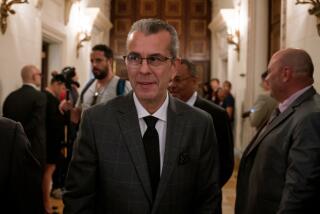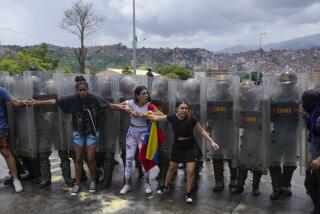Key Iran cleric’s party dismisses vote results
- Share via
BEIRUT — A day after commanders of the Revolutionary Guard warned there was no middle ground in the dispute over the reelection of President Mahmoud Ahmadinejad, the political party of one of Iran’s most powerful clerics Monday defiantly issued a statement dismissing the vote.
The statement by the Kargozaran party all but cleared away weeks of ambiguity about the stance of the cleric, Ayatollah Ali Akbar Hashemi Rafsanjani.
Rafsanjani, who heads two government councils that oversee the supreme leader and mediate disputes between branches, openly backed presidential candidate Mir-Hossein Mousavi.
But he has not spoken definitively about the June 12 vote, which was validated after a partial recount by the powerful Guardian Council.
“We declare that the result is unacceptable due to the unhealthy voting process, massive electoral fraud and the siding of the majority of the Guardian Council with a specific candidate,” the party’s statement said.
It followed a declaration by a senior Revolutionary Guard commander that “no one is impartial” in the dispute.
“There are two currents -- those who defend and support the revolution and the establishment, and those who are trying to topple it,” Gen. Yadollah Javani said at a Sunday news conference, according to the official Islamic Republic News Agency.
The Revolutionary Guard, the elite, ideologically driven military branch that formally answers to supreme leader Ayatollah Ali Khamenei, made its clearest statement yet about taking over the nation’s security apparatus.
“Because the Revolutionary Guard was assigned the task of controlling the situation, [it] took the initiative to quell a spiraling unrest,” Maj. Gen. Mohammed Ali Jafari, commander of the elite military branch, said at the news conference. “This event pushed us into a new phase of the revolution and political struggles, and we have to understand all its dimensions.”
The latest moves sharpened the confrontation between the pro-Ahmadinejad camp and supporters of Mousavi in the run-up to Thursday, when thousands are expected to take to the streets of a dozen Iranian cities for a rally marking the 10th anniversary of a deadly attack on a Tehran University dormitory that sparked weeks of riots and political strife.
The pro-government Basiji militia, under the command of the Revolutionary Guard, is also expected to mobilize to confront any demonstrators.
In the days after the election, many officials had whispered that the Revolutionary Guard had taken control of the nation’s security as a result of the unrest that followed the vote, which opposition leaders claim was stolen by Ahmadinejad.
But Jafari’s comments came the closest yet to publicly acknowledging what government supporters describe as a heroic intervention by the Revolutionary Guard, which has been increasing its economic and political power over the last decade. Critics decry the guard’s action as a palace “coup d’etat” instigated by military elites loyal to Khamenei, the guard’s commander in chief.
Jafari described “a new stage of the revolution” that is worrisome to some Western observers.
“If this continues, Iran may be heading to a much more militarized system of politics,” said Alireza Nader, an Iran specialist at the Rand Corp. “Before, there was give-and-take not only between the political institutions, but also the security organs. Now it looks like the [Revolutionary Guard] dominates all, even perhaps the Ministry of Intelligence.”
In a speech Monday, Khamenei acknowledged the continuing strife within the establishment and society over the vote, but warned Western leaders against exploiting the nation’s political turmoil for their own ends.
“The Western governments should be careful about their hostile words and behavior, because the Iranian nation will react,” he told supporters on the occasion of the birthday of the Shiite saint Imam Ali.
“Even if the Islamic Republic leaders are at odds on certain affairs, they are united against the enemy as far as the safeguarding [of] the country’s independence is concerned,” he said in a speech broadcast on state television. The remarks came after Vice President Joe Biden said Sunday that the U.S. would not stop an Israeli attack on Iran’s nuclear facilities.
But Khamenei also appeared to reach out to Mousavi supporters, after his deputies for weeks equated peaceful demonstrators with rioters.
“It is natural that some Iranians feel depressed and sad due to the failure of their preferred candidate,” he said.
The statement by Rafsanjani’s party, posted on reformist websites, demanded a restoration of public confidence after the vote count, an investigation into alleged violence against protesters, the release of political prisoners and the lifting of restrictions on media.
Over the weekend, Grand Ayatollah Asadollah Bayat Zanjani criticized the mass arrest of reformist activists and protesters.
“Every healthy mind casts doubt on the way the election was held,” the high-ranking cleric said in a statement published online.
“More regrettable are postelection large-scale arrests, newspaper censorship and website filtering and, above all, the martyrdom of our countrymen whom they describe as rioters,” he said.
The families of detainees also spoke out harshly against the government.
“My father is a defender of pure Islam,” Mehdi Saharkhiz, the son of imprisoned journalist Issa Saharkhiz, wrote Monday -- Father’s Day in Iran -- in a letter posted on various websites.
“My father has done his utmost to defend the republican nature of the regime,” he wrote. “He wants to establish religious democracy, but you and your accomplices prefer your mundane interests to anything else,” he wrote, insultingly referring to Ahmadinejad with the informal “you.”
The Revolutionary Guard is trying hard to stifle such criticism. The uniformed leaders, Jafari and Javani, joined by cleric Ali Saeedi, Khamenei’s representative, said they would henceforth play a more active role in defending the Islamic Republic’s core values, though they insisted this should not be interpreted as “interfering” in politics.
--
More to Read
Sign up for Essential California
The most important California stories and recommendations in your inbox every morning.
You may occasionally receive promotional content from the Los Angeles Times.













